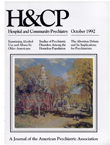Management of Early Postdischarge Adjustment Reactions Following Psychiatric Hospitalization
Abstract
Psychiatric patients frequently experience serious symptoms and demonstrate disturbed behaviors in the very early postdischarge period. Based on 25 years of clinical experience, the author reviews symptoms and behaviors that can occur and notes that they should most often be viewed as adjustment reactions rather than as exacerbations of the primary illness. A team approach to management of early postdischarge reactions that uses a psychiatrist and psychiatric nurse is effective. interventions include forewarning inpatients that problems may occur and helping them identify potential problems. Social skills training, learning therapies, and family counseling help patients prepare to cope. Accompanying patients home on passes during hospitalization is helpful, as is inviting them to visit the hospital during their first days at home. Scheduling mitial office visits within three days of discharge is another way of easing a difficult transition.
Access content
To read the fulltext, please use one of the options below to sign in or purchase access.- Personal login
- Institutional Login
- Sign in via OpenAthens
- Register for access
-
Please login/register if you wish to pair your device and check access availability.
Not a subscriber?
PsychiatryOnline subscription options offer access to the DSM-5 library, books, journals, CME, and patient resources. This all-in-one virtual library provides psychiatrists and mental health professionals with key resources for diagnosis, treatment, research, and professional development.
Need more help? PsychiatryOnline Customer Service may be reached by emailing [email protected] or by calling 800-368-5777 (in the U.S.) or 703-907-7322 (outside the U.S.).



